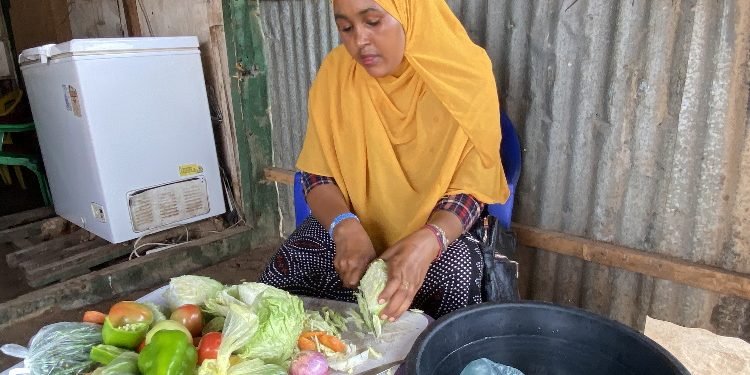
Falastin Ali Mohamed, 24, a young Somali mother of four living in Kenya’s Dadaab refugee camp complex, has been married and divorced four times since the age of 14.
Living in Hagadhera camp on scanty aid, she has been washing clothes to bring in some income to support her children since being divorced by her fourth husband in February.
“I am forced to find work because I can’t see my children suffering, I want them to get an education and a better life. That is what motivates me to do this hard work,” said Falastin, who earns a humble 200-300 Kenya shillings ($2-3) doing laundry work.
She is seven months pregnant, and has to take care of her children alone, trying impossibly to balance childcare with work.
“I sent the children to Koranic school and one child fell sick. I couldn’t find someone to take her to the hospital and I had to go to take her there myself. I only managed cooked for them all when I came back at midday,” Falastin recalled.
Falastin’s first marriage in 2012 as a young teen was arranged by her family. After three years and two children, the marriage dissolved. Her family then married her off again to an elderly man and after two years and one more child he left her.
She receives no support from the children’s fathers. Her family gets 20 kgs of wheat, 7.5 litres of cooking oil, and five bars of soap once a month as an aid allowance, which does not get them very far.
According to Falastin, it was never her idea to marry so young in the first place, although she did decide to marry again after the second divorce because she felt so stranded. She says she is now depressed and in despair and will never marry again.
“I thought to myself I need someone to help me raise the kids. I married another one hoping that he would be better than the other ones, but it just didn’t work out,” she said.
Early marriages are very common in Dadaab’s refugee camps, with many girls forced into marriages by cultural and other social pressures even though they often end badly.
One young divorcee who managed to reinvent herself after her failed teenage marriage is Fardowso Adan Idris, 23, who also has four children.
At the age of 16, Fardowso was married to her cousin. They separated five years later. Then, she decided to take a course in business run by Norwegian Refugee Council in the camps and threw herself into a career even though she had previously stayed at home to take care of her children.
Today Fardowsa runs a cafeteria in Hagadhera camp, working 15 hours a day to provide for her children and cover their school fees.
“I cook various different foods and we are doing well. Since I am not worried about the children’s clothes or their food or education, life is complete,” said Fardowso, feeling happy about her life.
Her business is thriving and she has opened two other restaurants and bought a house for 165,000 Kenya shillings ($1,500).
A youth leader in the camp who champions women’s rights, Fardowso Sirad, said roughly 60 girls in Hagadhera drop out of school to get married every year. Their marriages often end leaving them with the full burden of providing for their children.
Fardowsa said they have assisted 10 young single mothers in Hagadhera camp in the past six months to acquire skills training to better their lives.
“Sometimes these women are from poor backgrounds and the burden piles up when they get divorced with kids. The men usually abandon the family and neglect their duty of care. It’s possible for the women to resort to very low paid and difficult jobs,” she said.
Source: Radio Ergo


